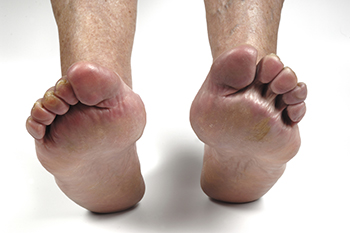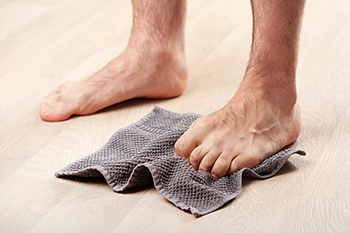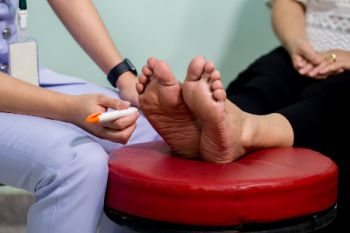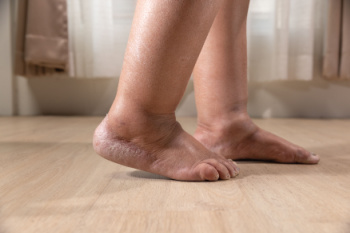
Heel cups are invaluable for individuals who spend long hours on their feet, providing essential support and cushioning to alleviate heel pain. These shoe inserts are particularly beneficial for those suffering from conditions like plantar fasciitis, which can be aggravated by insufficient support and poor shock absorption. Heel cups cushion the entire heel, from the point of impact with the ground to the edges and back, distributing the shock more evenly to reduce pressure on any single area. This helps make walking, running, and standing much more comfortable. Additionally, the gentle compression from heel cups can help reduce swelling in the heel and ankle. Professions such as nursing, retail, and culinary arts often involve prolonged standing. By using heel cups, people working in these fields can enhance their comfort and reduce heel pain. Consulting with a podiatrist can help in selecting the right heel cups and ensuring they are correctly fitted. If you experience heel pain, it is suggested that you make an appointment with a podiatrist for an exam and treatment.
Many people suffer from bouts of heel pain. For more information, contact Dr. Kendall Blackwell of InStride Wilson Podiatry Associates. Our doctor can provide the care you need to keep you pain-free and on your feet.
Causes of Heel Pain
Heel pain is often associated with plantar fasciitis. The plantar fascia is a band of tissues that extends along the bottom of the foot. A rip or tear in this ligament can cause inflammation of the tissue.
Achilles tendonitis is another cause of heel pain. Inflammation of the Achilles tendon will cause pain from fractures and muscle tearing. Lack of flexibility is also another symptom.
Heel spurs are another cause of pain. When the tissues of the plantar fascia undergo a great deal of stress, it can lead to ligament separation from the heel bone, causing heel spurs.
Why Might Heel Pain Occur?
Treatments
Heel pain should be treated as soon as possible for immediate results. Keeping your feet in a stress-free environment will help. If you suffer from Achilles tendonitis or plantar fasciitis, applying ice will reduce the swelling. Stretching before an exercise like running will help the muscles. Using all these tips will help make heel pain a condition of the past.
If you have any questions please contact our office located in Wilson, NC . We offer the newest diagnostic and treatment technologies for all your foot and ankle needs.
 Rheumatoid arthritis, or RA, is an autoimmune disorder where the immune system mistakenly attacks the joints, causing inflammation, pain, and swelling. This condition can significantly affect the feet, leading to discomfort and mobility issues. RA occurs due to a combination of genetic and environmental factors, and it is more common in women and those with a family history of the disease. Symptoms in the feet include persistent pain, swelling, stiffness, and deformities such as bunions and hammertoes. Early diagnosis is important and typically involves physical examinations, imaging tests, and blood tests to identify specific markers. Management of RA in the feet includes medications like anti-inflammatory drugs and disease-modifying antirheumatic drugs to control symptoms and prevent joint damage. Preventive measures involve maintaining a healthy weight, regular exercise, and wearing supportive footwear. In severe cases, surgical interventions may be necessary. If you have symptoms of rheumatoid arthritis in your feet, it is suggested that you schedule regular visits with a podiatrist to monitor and manage your foot health.
Rheumatoid arthritis, or RA, is an autoimmune disorder where the immune system mistakenly attacks the joints, causing inflammation, pain, and swelling. This condition can significantly affect the feet, leading to discomfort and mobility issues. RA occurs due to a combination of genetic and environmental factors, and it is more common in women and those with a family history of the disease. Symptoms in the feet include persistent pain, swelling, stiffness, and deformities such as bunions and hammertoes. Early diagnosis is important and typically involves physical examinations, imaging tests, and blood tests to identify specific markers. Management of RA in the feet includes medications like anti-inflammatory drugs and disease-modifying antirheumatic drugs to control symptoms and prevent joint damage. Preventive measures involve maintaining a healthy weight, regular exercise, and wearing supportive footwear. In severe cases, surgical interventions may be necessary. If you have symptoms of rheumatoid arthritis in your feet, it is suggested that you schedule regular visits with a podiatrist to monitor and manage your foot health.
Arthritis can be a difficult condition to live with. If you are seeking treatment, contact Dr. Kendall Blackwell from InStride Wilson Podiatry Associates. Our doctor can provide the care you need to keep you pain-free and on your feet.
Arthritic Foot Care
Arthritis is a term that is commonly used to describe joint pain. The condition itself can occur to anyone of any age, race, or gender, and there are over 100 types of it. Nevertheless, arthritis is more commonly found in women compared to men, and it is also more prevalent in those who are overweight. The causes of arthritis vary depending on which type of arthritis you have. Osteoarthritis for example, is often caused by injury, while rheumatoid arthritis is caused by a misdirected immune system.
Symptoms
Arthritic symptoms range in severity, and they may come and go. Some symptoms stay the same for several years but could potentially get worse with time. Severe cases of arthritis can prevent its sufferers from performing daily activities and make walking difficult.
Risk Factors
If you suspect your arthritis is affecting your feet, it is crucial that you see a podiatrist immediately. Your doctor will be able to address your specific case and help you decide which treatment method is best for you.
If you have any questions, please feel free to contact our office located in Wilson, NC . We offer the newest diagnostic and treatment technologies for all your foot care needs.

Flat feet can cause discomfort and impact overall mobility, and specific exercises can help strengthen the arches and alleviate symptoms. Towel scrunches are effective, and can be done by simply placing a towel on the floor, using your toes to scrunch it toward you, then release. Toe extensions involve sitting with your feet flat and lifting only your toes while keeping the rest of your foot on the ground. The stork stretch, where you balance on one foot while pulling the other foot towards your buttocks, helps improve balance and strengthen the foot muscles. Using a foot roller, back and forth under your arch, massages and stretch the muscles. These exercises, when practiced regularly, can enhance arch strength, reduce pain, and improve the overall function of flat feet. Flat feet can cause discomfort while standing or walking. If you have flat feet, it is suggested that you confer with a podiatrist who can perform a comprehensive foot exam and offer relief solutions, if needed.
Flatfoot is a condition many people suffer from. If you have flat feet, contact Dr. Kendall Blackwell from InStride Wilson Podiatry Associates. Our doctor will treat your foot and ankle needs.
What Are Flat Feet?
Flatfoot is a condition in which the arch of the foot is depressed and the sole of the foot is almost completely in contact with the ground. About 20-30% of the population generally has flat feet because their arches never formed during growth.
Conditions & Problems:
Having flat feet makes it difficult to run or walk because of the stress placed on the ankles.
Alignment – The general alignment of your legs can be disrupted, because the ankles move inward which can cause major discomfort.
Knees – If you have complications with your knees, flat feet can be a contributor to arthritis in that area.
Symptoms
Treatment
If you are experiencing pain and stress on the foot you may weaken the posterior tibial tendon, which runs around the inside of the ankle.
If you have any questions please feel free to contact our office located in Wilson, NC . We offer the newest diagnostic and treatment technologies for all your foot and ankle needs.
 Ankle pain while walking is a common issue that can arise from various conditions and injuries. This can be difficult just with regular movement, but particularly frustrating when you count walking as an important form of exercise in your life. The ankle is a complex joint connecting the foot to the leg, consisting of bones, ligaments, tendons, and muscles. Pain can result from sprains, strains, fractures, or conditions such as arthritis, tendinitis, and bursitis. Overuse, wearing improper footwear, and sudden changes in physical activity can also contribute to ankle pain. This pain can interfere with walking by causing discomfort, instability, and limited range of motion. Ankle pain may present as a sharp, stabbing sensation or a dull ache, often worsening with weight-bearing activities. Swelling, bruising, and stiffness are common symptoms accompanying the pain. To alleviate ankle pain, rest, compression, and elevation are effective initial treatments. Pain relievers and wearing supportive footwear can also help. Preventative measures include strengthening and stretching exercises, wearing appropriate shoes, and gradually increasing activity levels. If you have persistent or severe ankle pain, it is suggested that you schedule an appointment with a podiatrist for a proper diagnosis and treatment plan so you can walk comfortably again.
Ankle pain while walking is a common issue that can arise from various conditions and injuries. This can be difficult just with regular movement, but particularly frustrating when you count walking as an important form of exercise in your life. The ankle is a complex joint connecting the foot to the leg, consisting of bones, ligaments, tendons, and muscles. Pain can result from sprains, strains, fractures, or conditions such as arthritis, tendinitis, and bursitis. Overuse, wearing improper footwear, and sudden changes in physical activity can also contribute to ankle pain. This pain can interfere with walking by causing discomfort, instability, and limited range of motion. Ankle pain may present as a sharp, stabbing sensation or a dull ache, often worsening with weight-bearing activities. Swelling, bruising, and stiffness are common symptoms accompanying the pain. To alleviate ankle pain, rest, compression, and elevation are effective initial treatments. Pain relievers and wearing supportive footwear can also help. Preventative measures include strengthening and stretching exercises, wearing appropriate shoes, and gradually increasing activity levels. If you have persistent or severe ankle pain, it is suggested that you schedule an appointment with a podiatrist for a proper diagnosis and treatment plan so you can walk comfortably again.
Ankle and foot injuries are common among athletes and in many sports. They can be caused by several problems and may be potentially serious. If you are feeling pain or think you were injured in a sporting event or when exercising, consult with Dr. Kendall Blackwell from InStride Wilson Podiatry Associates. Our doctor will assess your condition and provide you with quality foot and ankle treatment.
Common Injuries
The most common injuries that occur in sporting activities include:
Symptoms
Symptoms vary depending upon the injury and in some cases, there may be no symptoms at all. However, in most cases, some form of symptom is experienced. Pain, aching, burning, bruising, tenderness, tightness or stiffness, sensation loss, difficulty moving, and swelling are the most common symptoms.
Treatment
Just as symptoms vary depending upon the injury, so do treatment options. A common treatment method is known as the RICE method. This method involves rest, applying ice, compression and elevating the afflicted foot or ankle. If the injury appears to be more serious, surgery might be required, such as arthroscopic or reconstructive surgery. Lastly, rehabilitation or therapy might be needed to gain full functionality in the afflicted area. Any discomfort experienced by an athlete must be evaluated by a licensed, reputable medical professional.
If you have any questions, please feel free to contact our office located in Wilson, NC . We offer the newest diagnostic and treatment technologies for all your foot care needs.

Peripheral neuropathy is a condition caused by damage to the peripheral nerves, often resulting in numbness, tingling, burning sensations, and pain in the extremities. There are several types of peripheral neuropathy, each with its own set of causes and symptoms. Regardless of the underlying cause, peripheral neuropathy can have a significant impact on the feet, leading to decreased sensation, balance issues, and an increased risk of foot injuries and ulcers. Diabetic neuropathy is one of the most common types and is caused by nerve damage from prolonged exposure to high blood sugar levels in people with diabetes. Other types include compressive neuropathy, which occurs when nerves are compressed or pinched, and toxic neuropathy, which can result from exposure to certain medications, chemicals, or toxins. Proper foot care, including regular inspections, supportive footwear, and maintaining good blood sugar levels for diabetes, is essential for managing symptoms and preventing complications associated with peripheral neuropathy. If your feet are affected with any of the above symptoms, it is strongly suggested that you meet with a podiatrist who can offer you effective methods to manage the type of neuropathy you have.
Neuropathy
Neuropathy can be a potentially serious condition, especially if it is left undiagnosed. If you have any concerns that you may be experiencing nerve loss in your feet, consult with Dr. Kendall Blackwell from InStride Wilson Podiatry Associates. Our doctor will assess your condition and provide you with quality foot and ankle treatment for neuropathy.
What Is Neuropathy?
Neuropathy is a condition that leads to damage to the nerves in the body. Peripheral neuropathy, or neuropathy that affects your peripheral nervous system, usually occurs in the feet. Neuropathy can be triggered by a number of different causes. Such causes include diabetes, infections, cancers, disorders, and toxic substances.
Symptoms of Neuropathy Include:
Those with diabetes are at serious risk due to being unable to feel an ulcer on their feet. Diabetics usually also suffer from poor blood circulation. This can lead to the wound not healing, infections occurring, and the limb may have to be amputated.
Treatment
To treat neuropathy in the foot, podiatrists will first diagnose the cause of the neuropathy. Figuring out the underlying cause of the neuropathy will allow the podiatrist to prescribe the best treatment, whether it be caused by diabetes, toxic substance exposure, infection, etc. If the nerve has not died, then it’s possible that sensation may be able to return to the foot.
Pain medication may be issued for pain. Electrical nerve stimulation can be used to stimulate nerves. If the neuropathy is caused from pressure on the nerves, then surgery may be necessary.
If you have any questions, please feel free to contact our office located in Wilson, NC . We offer the newest diagnostic and treatment technologies for all your foot care needs.
 Edema in the legs and feet is a common condition characterized by swelling. The swelling is caused by excess fluid trapped in bodily tissues. Many factors can contribute to such swelling, like standing or sitting for long periods, which hinders proper blood flow. It also may stem from serious underlying health issues, including heart disease, kidney problems, or liver disease. Other contributing factors to edema include pregnancy, obesity, and certain medications that may cause fluid retention. Symptoms of edema include swollen, puffy skin that may feel tight. When the skin is pressed, it may also produce a dimple. There are many treatment options for edema, and a podiatrist, or foot doctor, is a specialist that can provide a personalized treatment plan. If you are affected by swollen feet and legs, it is suggested that you make an appointment with a podiatrist today for proper care.
Edema in the legs and feet is a common condition characterized by swelling. The swelling is caused by excess fluid trapped in bodily tissues. Many factors can contribute to such swelling, like standing or sitting for long periods, which hinders proper blood flow. It also may stem from serious underlying health issues, including heart disease, kidney problems, or liver disease. Other contributing factors to edema include pregnancy, obesity, and certain medications that may cause fluid retention. Symptoms of edema include swollen, puffy skin that may feel tight. When the skin is pressed, it may also produce a dimple. There are many treatment options for edema, and a podiatrist, or foot doctor, is a specialist that can provide a personalized treatment plan. If you are affected by swollen feet and legs, it is suggested that you make an appointment with a podiatrist today for proper care.
Swollen feet can be a sign of an underlying condition. If you have any concerns, contact Dr. Kendall Blackwell of InStride Wilson Podiatry Associates. Our doctor can provide the care you need to keep you pain-free and on your feet.
Swollen feet are a common ailment among pregnant women and people who stand or sit for extended periods. Aging may increase the possibility of swollen feet and patients who are obese often notice when their feet are swelling too. There may be medical reasons why swollen feet occur:
Swollen feet can also be caused by bone and tendon conditions, including fractures, arthritis, and tendinitis. Additionally, there may be skin and toenail conditions and an infection may cause the feet to swell. Patients who take medicine to treat high blood pressure may be prone to getting swollen feet.
Many patients elevate their feet to help relieve the swelling and this is generally a temporary remedy. When a podiatrist is consulted the reason behind the swelling can be uncovered and subsequently treated.
If you have any questions please feel free to contact our office located in Wilson, NC . We offer the newest diagnostic tools and technology to treat your foot and ankle needs.

Children's feet undergo remarkable changes and developments as they progress through various stages of infancy and early childhood. In the pre-crawling stage, babies' feet are flexible and mostly fat pads, allowing them to kick and wiggle freely. As they transition to crawling, their feet adapt to bearing weight, developing arches and strengthening muscles necessary for mobility. Throughout the toddler years, a child's feet continue to evolve, with walking and running becoming primary modes of transportation. During this stage, proper footwear becomes vital to support their growing feet and provide stability. By the time children enter kindergarten and beyond, their feet have typically developed arches, and they exhibit more refined coordination and balance. As they engage in more physical activities and sports, maintaining foot health through wearing well-fitted shoes, regular exercise, and proper hygiene becomes essential. If you have any questions about the development of your child’s feet or what type of shoes to purchase, it is suggested that you consult a podiatrist who can address them.
The health of a child’s feet is vital to their overall well-being. If you have any questions regarding foot health, contact Dr. Kendall Blackwell of InStride Wilson Podiatry Associates. Our doctor can provide the care you need to keep you pain-free and on your feet.
Tips for Keeping Children's Feet Healthy
If you have any questions, please feel free to contact our office located in Wilson, NC . We offer the newest diagnostic and treatment technologies for all your foot care needs.

Heel pain, a common foot ailment, can disrupt daily activities and signal underlying issues. Typically stemming from conditions like plantar fasciitis, Achilles tendonitis, or heel spurs, it manifests as discomfort or tenderness beneath or behind the heel. Treatment often involves a combination of conservative measures, such as rest, stretching exercises, custom orthotic inserts, and supportive footwear to alleviate symptoms and promote healing. In some cases, nonsteroidal anti-inflammatory drugs or corticosteroid injections may be recommended for pain relief. However, if left unaddressed, heel pain can lead to chronic discomfort, mobility limitations, and even changes in gait. Additionally, persistent heel pain may indicate more serious conditions that require specialized intervention. If you have persistent or worsening heel pain, it is suggested that you schedule an appointment with a podiatrist for an individualized treatment plan that can expedite recovery and prevent complications.
Many people suffer from bouts of heel pain. For more information, contact Dr. Kendall Blackwell of InStride Wilson Podiatry Associates. Our doctor can provide the care you need to keep you pain-free and on your feet.
Causes of Heel Pain
Heel pain is often associated with plantar fasciitis. The plantar fascia is a band of tissues that extends along the bottom of the foot. A rip or tear in this ligament can cause inflammation of the tissue.
Achilles tendonitis is another cause of heel pain. Inflammation of the Achilles tendon will cause pain from fractures and muscle tearing. Lack of flexibility is also another symptom.
Heel spurs are another cause of pain. When the tissues of the plantar fascia undergo a great deal of stress, it can lead to ligament separation from the heel bone, causing heel spurs.
Why Might Heel Pain Occur?
Treatments
Heel pain should be treated as soon as possible for immediate results. Keeping your feet in a stress-free environment will help. If you suffer from Achilles tendonitis or plantar fasciitis, applying ice will reduce the swelling. Stretching before an exercise like running will help the muscles. Using all these tips will help make heel pain a condition of the past.
If you have any questions please contact our office located in Wilson, NC . We offer the newest diagnostic and treatment technologies for all your foot and ankle needs.